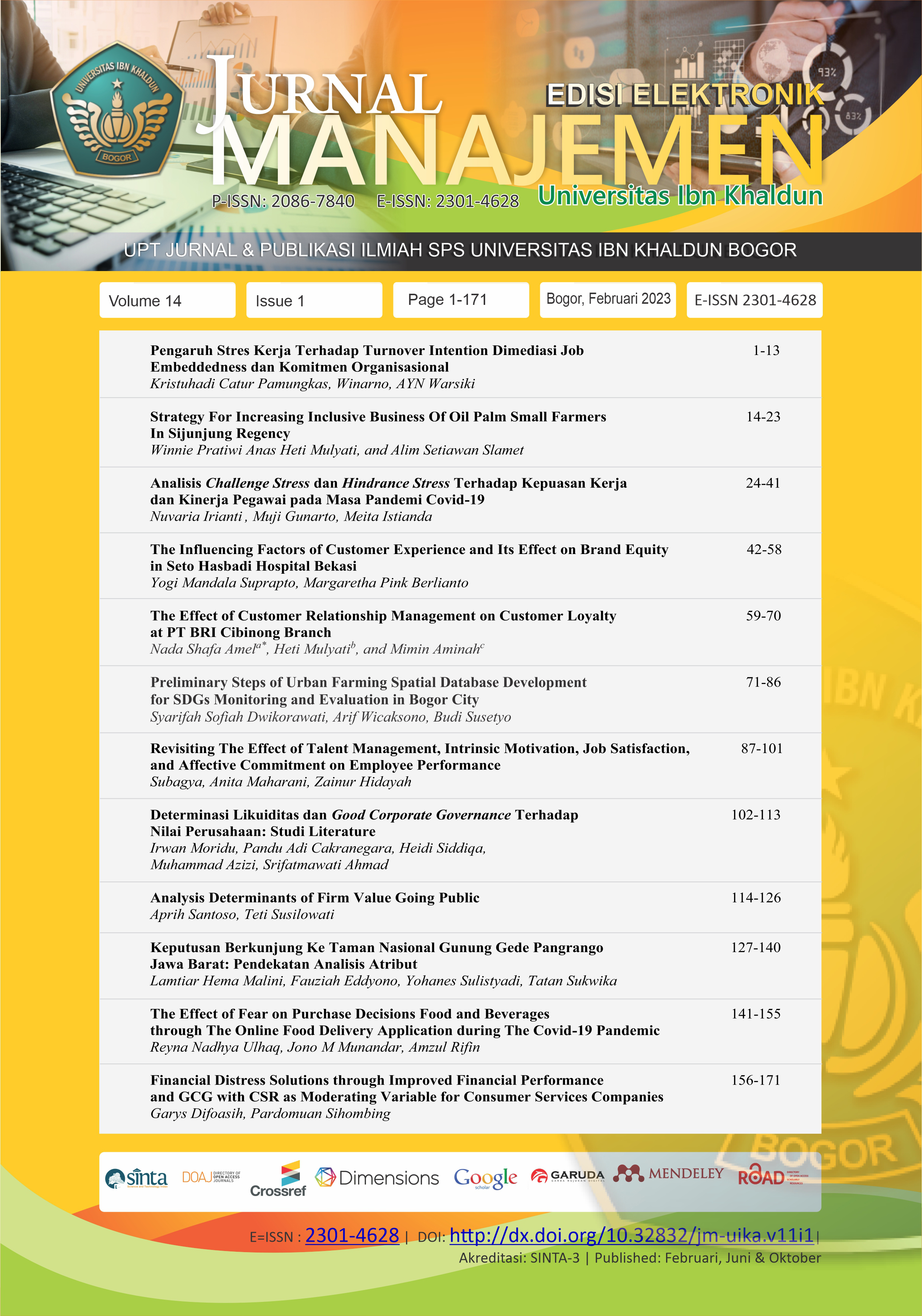Strategy for Increasing Inclusive Business of Oil Palm Small Farmers in Sijunjung Regency
DOI:
https://doi.org/10.32832/jm-uika.v14i1.8386Keywords:
AHP, inclusive business model, palm oilAbstract
West Sumatra is one province that is growing its oil palm planting potential. Sijunjung Regency is one of West Sumatra's oil palm plantation hubs and home to several small farmers. Smallholder oil palm farms operated by smallholders have not been able to deliver optimum benefits and are still far behind other plantations, which renders their business exclusive. The lack of smallholder participation in the value chain is a barrier to creating an inclusive business. The purpose of this study was to develop a strategy to expand the inclusive business of smallholder oil palm producers in Sijunjung Regency. This study used the Analytical Hierarchy Process (AHP) to discover the most effective farming practices. Smallholder Assistance including Good Agriculture Practices (GAP) and Managerial is the most important strategy in this study, followed by ease of access to finance.
References
Agyekumhene, C., De Vries, J., van Paassen, A., Schut, M., & MacNaghten, P. (2020). Making smallholder value chain partnerships inclusive: Exploring digital farm monitoring through farmer friendly smartphone platforms. Sustainability (Switzerland), 12(11). https://doi.org/10.3390/su12114580
Blok, V., Omta, S. W. F. (Onno), & Sjauw-Koen-Fa, A. R. (2016). Critical Success Factors for Smallholder Inclusion in High Value-Adding Supply Chains by Food & Agribusiness Multinational Enterprises. International Food and Agribusiness Management Review, 19(1), 83–112. https://ageconsearch.umn.edu/record/230835/files/520150029.pdf
Boer, D. De, Amzul, L., Maastricht, S. M., & Kusnadi, N. (2019). Rantai nilai produktif yang inklusif , gambaran umum tentang Indonesia ' s industri kakao. 9(5).
BPS-Statistics Indonesia. (2020). Indonesian Oil Palm Statistics 2009. 1–155.
Chamberlain, W., & Anseeuw, W. (2019). Inclusive businesses in agriculture: Defining the concept and its complex and evolving partnership structures in the field. Land Use Policy, 83(February), 308–322. https://doi.org/10.1016/j.landusepol.2019.02.008
Danse, M., Klerkx, L., Reintjes, J., Rabbinge, R., & Leeuwis, C. (2020). Unravelling inclusive business models for achieving food and nutrition security in BOP markets. Global Food Security, 24(October 2019). https://doi.org/10.1016/j.gfs.2020.100354
Devaux, A., Torero, M., Donovan, J., & Horton, D. (2016). VALUE-CHAIN DEVELOPMENT : SUCCESSES AND CHALLENGES Expanded Access to Agricultural Product Markets. www.
German, L. A., Bonanno, A. M., Foster, L. C., & Cotula, L. (2020). "Inclusive business” in agriculture: Evidence from the evolution of agricultural value chains. World Development, 134. https://doi.org/10.1016/j.worlddev.2020.105018
Heriyanto, H., Asrol, A., Karya, D., & Ningsih, V. Y. (2019). Analisis Faktor Produksi Kalapa Sawit Rakyat Menurut Tipologi Lahan di Kabupaten Indragiri Hilir Provinsi Riau. Jurnal Lahan Suboptimal, 7(1), 14–25. https://doi.org/10.33230/jlso.7.1.2018.366
Jezeer, R., Slingerland, M., Laan, C. Van Der, & Pasiecznik, N. (2019). Improving smallholder inclusiveness in palm oil production in palm oil production. 15.
[KEMENTAN] Kementerian Pertanian. (2015). Agricultural Statistics: Center for Agricultural Data and Information. Kementerian Pertanian.
Marimin. (2017). Sistem pendukung pengambilan keputusan dan sistem pakar. Bogor: IPB Press.
Mayrowani. (2012). Pengembangan Pertanian Organikdi Indonesia. Forum Penelitian Afgro Ekonomi Vol. 30 No. 2, 91-108.
Obayelu, A.A.O., Oluwalana, E., & Ogunmola, O. (2017). What does literature say about the determinants of adoption of agricultural technologies by smallholders farmers? https://doi.org/10.19080/ARTOAJ.2017.06.555676.
Pasiecznik, N., & Savenjie, H. (2015). Effective forest and farm producer organizations. ETFRN News 57 Tropenbos International, Wageningen the Netherlands vi + 218 PP.
Permatasari, P. C. (2018). Model bisnis inklusif untuk mendukung kelangsungan usaha petani: studi kasus rantai nilai kopi arabika di jawa timur, indonesia prisca christian permatasari.
Ros-Tonen, M. A., Bitzer, V., Laven, A., Ollivier de Leth, D., Van Leynseele, Y., & Vos, A. (2019). Conceptualizing inclusiveness of smallholder value chain integration. Current Opinion in Environmental Sustainability, 41(November), 10–17. https://doi.org/10.1016/j.cosust.2019.08.006
Sahara, Haryadi, & N., K. (2018). Pembiayaan bagi petani kecil di sektor kelapa sawit: Analisis kesenjangan antara skema kredit yang tersedia dan pembiayaan yang dihadapi petani kecil. Pembiayaan Bagi Petani Kecil Di Sektor Kelapa Sawit: Analisis Kesenjangan Antara Skema Kredit Yang Tersedia Dan Pembiayaan Yang Dihadapi Petani Kecil. https://doi.org/10.17528/cifor/006885
Saadun, N., E.A.L. Lim., S M. Esa, F Ngu, F Awang, Gimin, I H Johari, M A Firdaus, N I Wagimin dan B Azhar. (2018). Socio-ecological perspectives of engaging smallholders in environmental-friendly palm oil certification schemes. Land Use Policy 72: 333–340.
Sautter, J.A., Czap, N.V., Kruse, C., & Lynne, G.D. (2011). Farmers' decisions regarding carbon sequestration: a meta economic view. Soc. Nat. Resour. 24 (2), 133–147.
Shofi, A. S., Agustina, T., & Subekti, S. (2019). Penerapan Good Agriculture Practices (Gap) Pada Usahatani Padi Merah Organik. JSEP (Journal of Social and Agricultural Economics), 12(1), 56. https://doi.org/10.19184/jsep.v12i1.9944
Sulle, E., Hall, R., & Paradza, G. (2014). Inclusive business models in agriculture ? Learning from smallholder cane growers in Mozambique. 66, 11–12. www.future-agricultures.org
Downloads
Published
How to Cite
Issue
Section
License
Authors who publish with this journal agree to the following terms:
- Authors retain copyright and grant the journal right of first publication with the work simultaneously licensed under a Creative Commons Attribution-NonCommercial-ShareAlike 4.0 International License that allows others to share the work with an acknowledgement of the work's authorship and initial publication in this journal.
- Authors can enter into separate, additional contractual arrangements for the non-exclusive distribution of the journal's published version of the work (e.g., post it to an institutional repository or publish it in a book), with an acknowledgement of its initial publication in this journal.
- Authors are permitted and encouraged to post their work online (e.g., in institutional repositories or on their website) prior to and during the submission process, as it can lead to productive exchanges, as well as earlier and greater citation of published work (See The Effect of Open Access).











